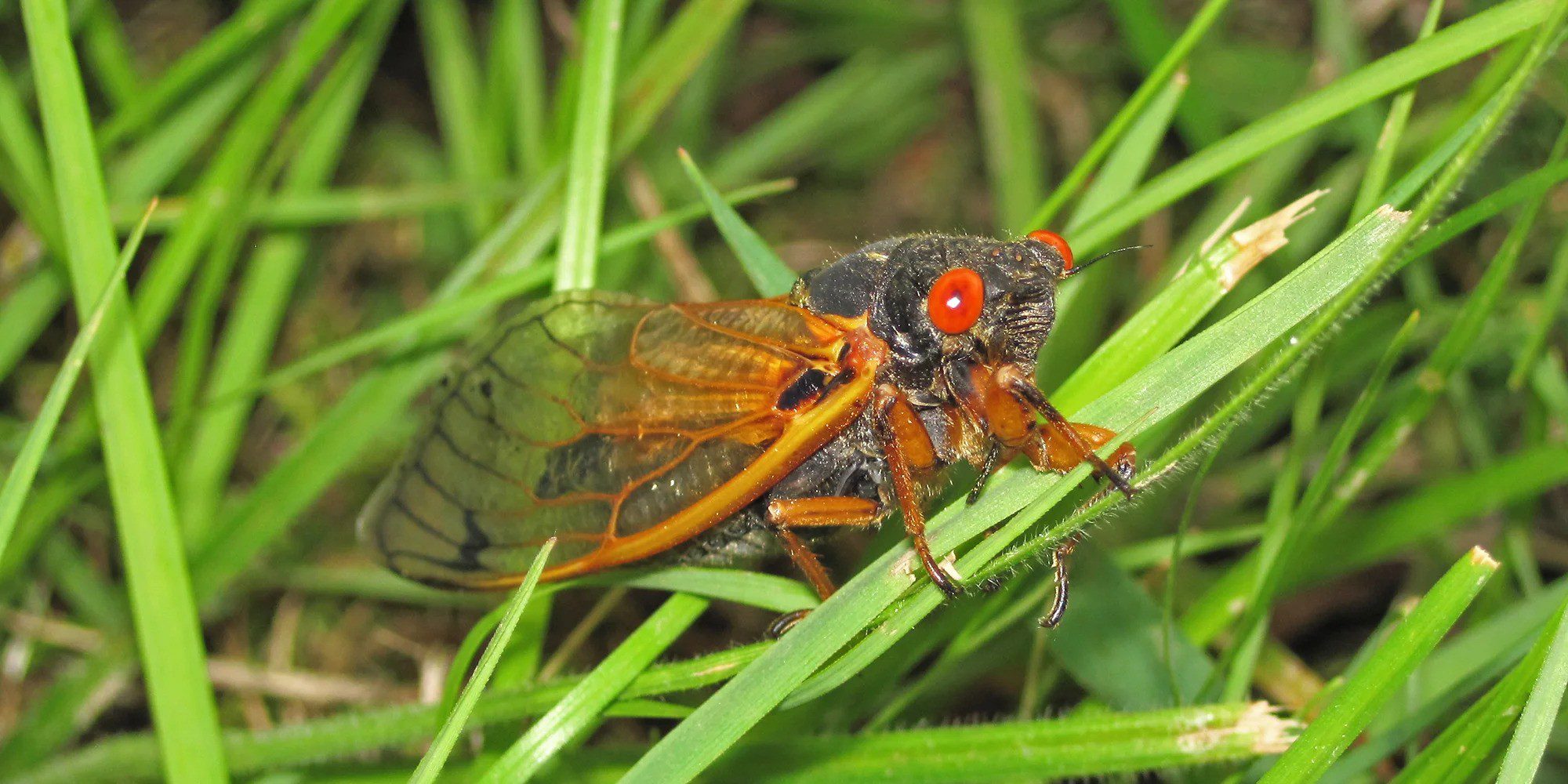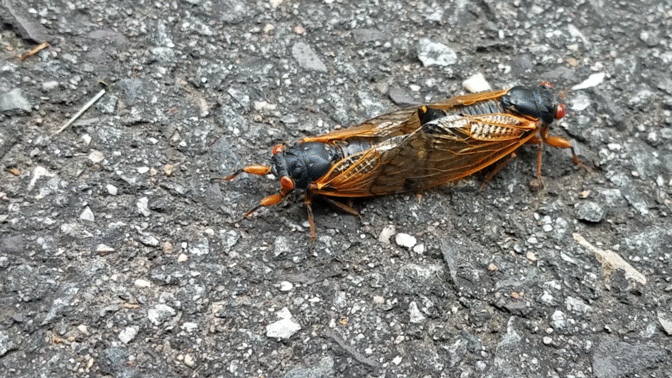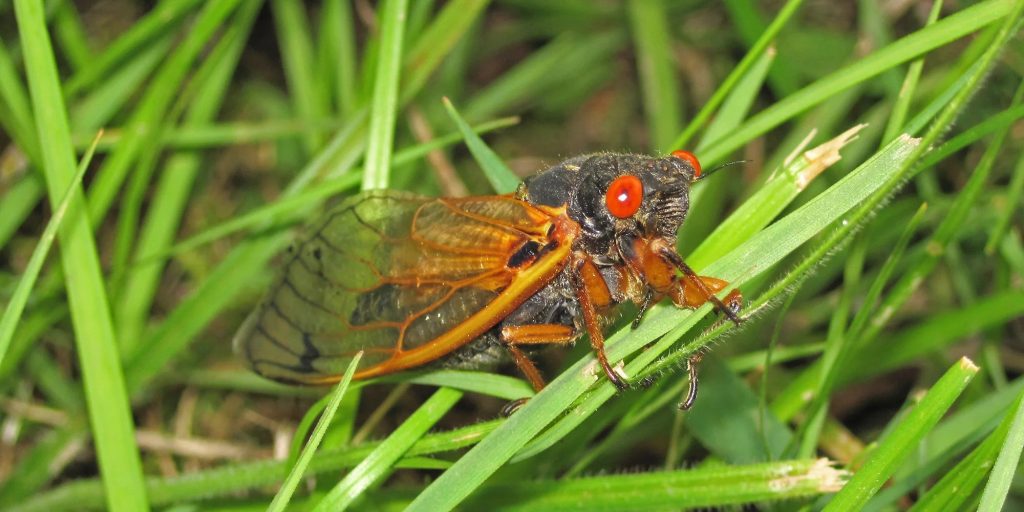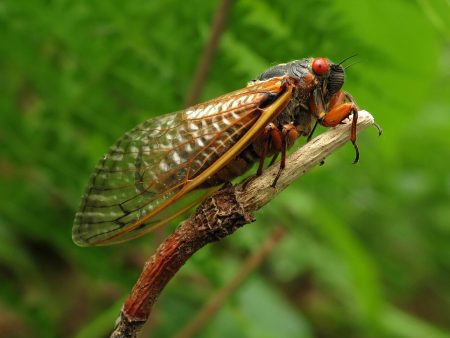Cicadas that come out regularly every 13 or 17 years are some of the most interesting insects in the world. When the time is right, millions of cicadas spread out across the midwestern and eastern United States.
This year is unique because both a 13-year group and a 17-year group will appear at the same time, especially around the Illinois area. A “brood” is the scientific term for a group of cicadas that emerge together.
How loud is it exactly?

The first thing you’ll notice when a large group of cicadas is coming closer is the noise. Periodical cicadas (genus Magicicada) are some of the most deafening insects in the world. They make noise that is over 100 decibels up close, which is about as loud as a rock concert or car racing event. Any louder and the human ear could be damaged. According to researchers at Johns Hopkins, the cicada’s high-pitched buzzing sound could make tinnitus worse. The sound has been described as being right next to a spinning food blender at max speed or a gas-powered lawn mower.
Is cicada noise really that harmful? In 2021, the CDC’s NIOSH Noise and Bio-Acoustics Team conducted field experiments with professional decibel monitors to disprove some myths and set the record straight. They reported that the level of cicada noise measured 3 feet from a heavily infested tree may indeed approach 100 dBA. However, the noise level will be substantially lower if you are standing farther away (e.g., 94 dBA at 6 feet, 88 dBA at 12 feet, 82 dBA at 24 feet).
“It is true that noise exposures at or above 85 A-weighted decibels (85 dBA) are considered hazardous to hearing. However, safe noise exposure limits are established assuming repeated exposures over long periods of time. The NIOSH REL has been set to prevent hearing loss from noise at work over 8-hour workdays, 40-hour work weeks, and a 40-year working lifetime.”
“Although it takes repeated exposures of sufficient duration to cause hearing loss, NIOSH recommends that preventive measures be used any time the noise is 85 dBA or higher. . . regardless of duration. This is not because the sound is immediately dangerous to hearing, it is because you don’t always know how long the sound will last or what other noise exposures you might accumulate over time. In addition, susceptibility to noise-induced hearing loss varies across individuals, and we can’t know whether a particular person is highly susceptible to noise effects until after it is too late. What’s more, noise is associated with problems other than hearing loss, such as stress and hypertension3 and tinnitus. Imagine hearing a sound like cicadas—all day, every day—even while you try to sleep… for some people that is the reality of tinnitus. Reducing noise levels can help prevent these other unwanted effects of noise. Remember this: If the noise level exceeds 85 dBA (use the NIOSH SLM app to check), it’s always a good practice to move away or wear some hearing protection,” the researchers wrote.
The cicada song
For the cicadas, this high-pitched music is not just noise. It’s actually a crucial part of their survival plan, meant to help them identify each other and find mates.

The cicada shrill is known as chorusing. It’s created only by male cicadas vibrating their tymbals, a noise-making organ on the side of their abdomen. Each male cicada has a pair of tymbals, which they use by contracting internal muscles, creating a loud pop as the tymbals bend. The sound is made louder by the insect’s hollow abdomen which acts as a resonance chamber. Relaxing these muscles returns the tymbals to their original position, ready for the next sound wave. This rapid contraction and relaxation creates the cicada’s distinct loud song.
Females do not have tymbals, so they don’t make noise. They have abdomens filled with organs and tissues for egg production and oviposition.
The volume and pitch of these calls serve a dual purpose. Mainly, they are mating calls, with each species singing a unique tune to attract females of their kind. This specificity prevents cross-species breeding and supports diverse cicada populations. However, not all aspects of their song’s purpose are fully understood by scientists, adding an element of mystery to these noisy creatures. Cicadas will also make a shrill sound in times of distress, such as when they feel threatened by another animal.
A Natural Defense Mechanism
Aside from singing love songs, cicadas use their strong voices for protection. They sing mostly during the warmest times of the day, and their chorus can drive away birds. The loudness of the cicada’s song is unpleasant to birds (and most humans as well) and disturbs their communication, making it difficult for them to hunt efficiently. By coordinating their calls, cicadas in the same group increase their combined volume, even more improving their defense against avian predators.
As for the cicadas themselves, they have their own 'earmuffs' to protect them from their loud sounds. The insects have a set of tympana — mirror-like membranes that act as ears — that can temporarily deactivate their hearing to prevent damage while singing.
How the sound affects us
Even though the cicada song is a crucial part of their unusual lives, let's admit it: the noise can be extremely irritating. In fact, it may even impact your cognitive performance (unless you enjoy their unique shrill). In a 2021 study, researchers at the Indiana University Bloomington examined how the intense noises made by Brood X cicadas, which can reach up to 100 decibels, influence human cognitive functions.
This particular group emerges every 17 years and has been heard across almost every county in Indiana. The experiment involved participants completing the Montreal Cognitive Assessment in both quiet conditions and amid the cacophony of cicadas. Participants were categorized based on their liking for cicada sounds, with the hypothesis that those who enjoyed the noise might perform better in its presence. The results showed that participants who disliked cicada sounds scored somewhat lower in noisy conditions, while those who liked the sounds showed no significant change in their performance, although their scores tended to be slightly higher.
The findings indicate a statistically noteworthy impact on cognitive functions, particularly in memory recall, which was slower under cicada noise conditions.
Fortunately, cicada swarming only occurs every 13 or 17 years in a specific area. When they emerge, you can expect the 'concert' to last 1-2 weeks, depending on the species' lifespan.
The life of a cicada is a marvel of sound and biological cleverness. As researchers continue to uncover the intricacies of these creatures, each discovery adds a new layer of insight into how life thrives through adaptation and innovation. Their ability to coexist through specialized calls is proof of the complex interplay of nature's evolutionary forces.








